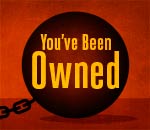Play it Again, Sam (But only if you pay for it again)
jeudi 1 novembre 2012 à 16:42
Our friends at the Electronic Frontier Foundation (EFF) are fighting them hard in court. This week the Supreme Court is hearing Kirtsaeng v. Wiley, and the outcome could have enormous repercussions for the longstanding "first sale" doctrine. First sale is what gives you the right to resell things you have purchased, but now companies are trying to find a way to control the secondary market (like ebay, craigslist, or your tag sale). According to the EFF, "The Kirtsaeng case specifically deals with textbooks, but the Court's decision is likely to affect a range of markets and consumers. If the court goes the wrong way on this, it could threaten your ability to buy and sell all kinds of products that might contain copyrighted material."
It should come as no surprise that while this case relates to textbooks, the RIAA and the MPAA are all over it. They have filed their own legal briefs and have lobbied the Obama administration to do the same. But they won't stop there. These powerful lobbying interests are also working to find loopholes that will take away our ability to own anything copyrighted in the future. We increasingly live in a world where digital books, music and movies cannot be purchased, only "licensed." These "end user license agreements" -- often combined with proprietary software -- prevent us from selling or modifying what we've paid for, and even prevent us from lending ebooks to friends or using text-to-speech to read ebooks aloud.
Big Hollywood and big music won't stop there. New legislation will undoubtedly be their next attempt to satiate their greed. The Free Software Foundation is working with our friends at the EFF and Demand Progress to defend our first sale rights and fight coercive end user license agreements. Visit the EFF's site to tell Congress to defend your rights to do want you want with the digital goods you paid for.